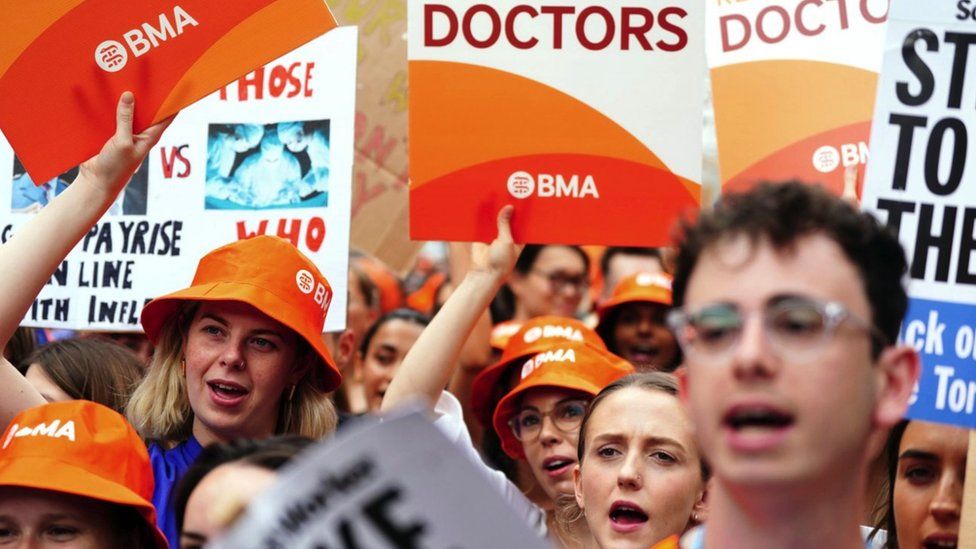ARTICLE AD BOX
 Image source, PA Media
Image source, PA Media
By Nick Triggle and Rob Sissons
BBC News
The NHS is having to pay millions of pounds to plug holes in front-line staffing left by striking doctors.
In one case, a consultant in Plymouth was paid more than £3,000 to cover a 12.5-hour junior-doctor night shift.
Paying for cover is costing hospitals three times more than they save in the wages deducted from striking junior doctors, hospitals are reporting.
The finding comes as junior doctors in England walk out again, joining consultants already on strike.
It is the first time junior and senior doctors have been on strike at the same time - action that looks set to cause significant disruption.
During the first three junior doctor's strikes, University Hospitals Plymouth paid nearly £1.8m for cover - £1.59m to consultants - while less than £430,000 was saved in wage deductions.
And it is a similar story in other trusts that responded to a BBC News Freedom of Information request.
During the first four walkouts, Hull University Hospitals NHS Trust, where three-quarters of junior doctors have been joining picket lines, paid nearly £1.7m to consultants and other senior doctors providing cover - three times the amount saved.
It had to pay the premium rates the British Medical Association (BMA) was urging members to charge, a trust spokeswoman said.
"We are required to provide essential services, such as cancer care and emergency care, for the population of the Humber and North Yorkshire region, whatever the obstacles," she said.
"To achieve this during the doctors' strikes is especially challenging given the conditions of strike action set out by the BMA."
The premium rates are set out in the BMA's rate card, which the union recommends doctors use when asked to do non-contractual work. And this includes covering for junior doctors even in their own department.
For consultants, the rates range from £161 an hour for day shifts, about three times what they would normally be paid under the terms of their contract, to up to £269 for night shifts.
But it is up to trusts to decide whether to pay theses rates - and data provided by the NHS shows not all are.
Matthew Taylor, head of the NHS Confederation, which represents hospitals, said his members had tried to resist but many had had to give in to keep vital services running.
"For a long time, many trusts have been reluctant or refused to pay this much higher rate - but as the strikes have rumbled on, we're hearing of more instances where trusts have had to in order to maintain safe cover," he said.
And hospitals were likely to become even more desperate now junior doctors and consultants were striking at the same time.
"We believe that trusts will be left with little option but to pay over the odds to keep patients safe," Mr Taylor said.
Planning, preparing and dealing with the aftermath of strikes was now taking up a third of senior managers' time, Mr Taylor added.
Cancelling treatments also incurs costs, as hospitals' income is linked to the number of patients seen.
The four-day junior doctors' strike in April had led to more than 200,000 cancelled appointments and cost the NHS more than £300m, NHS England estimated.
And NHS Providers, which represents health managers, says the likely total cost of the junior doctors' walkouts, which totalled 19 days before this week, will be above £1bn.
Deputy chief executive Saffron Cordery said: "Trusts really are bearing the financial brunt of month after month of industrial action."
And the premium rates being demanded reflected "just how strained industrial relations" had become.
"We need government and unions to sit down and talk to stop strikes becoming business as usual," Ms Cordery added.
'Workforce shortages'
The BMA say the rates reflect the "market value".
A spokeswoman said: "The rate card has been developed to address the fact that for too long trusts have been continually leaning on consultants to work many extra hours in excess of their normal contracts, not just during strike days but in the face of rota gaps and chronic workforce shortages.
"Crucially, the principle is to ensure that NHS trusts adopt a fairer and more consistent approach with rates based on those already being offered in parts of the country to reflect the market value of doctors' work."
The union also pointed out the estimated £1bn cost would have been enough to fund for this year the 35% pay rise junior doctors are after.
Related Internet Links
The BBC is not responsible for the content of external sites.

 1 year ago
47
1 year ago
47








 English (US) ·
English (US) ·